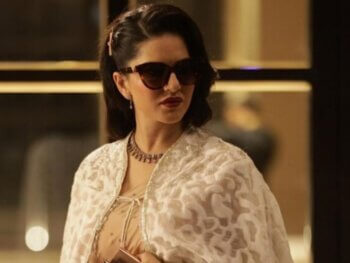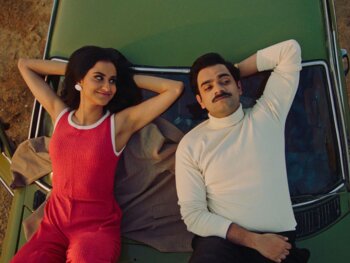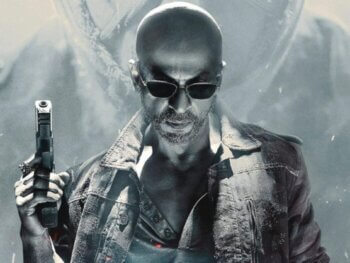
A Train Bloodbath With A 90% On Rotten Tomatoes – Why You Should Watch TIFF-Acclaimed Indian Action Flick ‘Kill’
Entertainment Jul 03, 2024
Director Nikhil Nagesh Bhat, and stars Lakshya and Raghav Juyal, sit down with ANOKHI LIFE to discuss the finer points of unleashing a bloody battle royale on a train in their off-the-rails action pic ‘KILL’.
This past September, the Toronto International Film Festival witnessed the debut of an Indian action flick like no other — a movie that literally and figuratively lived up to the oft-used boast “one wild ride” like few ever have.
Executive-produced by Indian film giant Karan Johar, KILL opens on army commando Amrit (Lakshya) and his fellow soldier buddy Viresh (Abhishek Chauhan) as they hop a passenger train looking to reunite Amrit with his girlfriend Tulika (Tanya Maniktala), who is being whisked away to New Delhi by her parents for an unwanted marriage. Unfortunately, there are a few more unexpected guests on the Rajdhani Express today — about 40 of them — as a gang of armed bandits led by the ruthless, unhinged Fani (Raghav Juyal) show up and unleash chaos. Suddenly, Amrit’s battle to win back his lost love turns into a gory, bone-crunching fight for survival. Good thing our hero is a one-man army.
The film scored big with audiences at TIFF’s notorious Midnight Madness slate and with critics, boasting an above-90% score on Rotten Tomatoes ahead of its wide theatrical release on July 4.
During the festival, ANOKHI LIFE sat down with director Nikhil Nagesh Bhatt, and leading men Lakshya and Raghav Juyal, to talk about the complexities of shooting a nonstop brawl in the cozy confines of a train car, making a pulse-pounding action movie that also has some heart and more.
Anokhi Life: Just how difficult was it to contain all this carnage in so small a setting?
Nikhil Nagesh Bhatt: Yes, it was a pretty challenging shoot. I’ll talk in terms of logistics first — it’s a very narrow space and our crew was around 300. So, for example, if the camera department is working, only they can work. The art department cannot go inside. In a normal set, each department is working all together. First and foremost, these guys [the actors] would practice. After the practice was done, then the lighting would happen. After the lighting happened, the art department would go and place things. After that was done, then the blood was spilled. And then the other actors were brought in, there was a soft rehearsal, then you used to shoot.
That’s the logistical challenge, but otherwise it was quite fun. It was a joy ride. We were loving what we were doing.
A film like this needs a compelling push and pull between the protagonist and the antagonist. Can you talk about the intrigue between our hero Amrit and our villain Fani?
Raghav Juyal: I think it’s the contrast. One is really ambitious, and because of that ambition, he goes to vicious levels of planning and plotting and all of those things; and one is really righteous, and all of those things were in our body languages too, in the rhythm of the characters. For me, it was really playful. I loved the character. I loved that I could go anywhere.
Lakshya: Of course, he’s the antagonist and I’m the protagonist of the film, but we are very similar, if you ask me. Because a) we are highly motivated to prove ourselves. Of course, Fani is a guy who’s been suppressed by hi father. You can see in a lot of ways he’s trying to prove himself. You must have observed in the film as well that his father is always trying to correct him. So Fani is also kind of a rebel. Amrit is not much of a rebel — he’s a very righteous guy, he’s a commando, so he has taken an oath. To a certain point, you only see him defending people, you only see him saving people because that’s what he believes in — until he suffers something he has never faced in his life, he has never faced personal loss in his life. So, all his righteousness, all his principles, all his values — they go out the window. And he’s like, “You know what? Fuck you, man. I’m going to do what you’ve been doing all your life, but in a way that you’ve never seen it.” So, in a way, I give a taste of his own medicine to him.
Pulling off the action is one thing, but getting us to invest in the characters is another. What was that balance like — of ensuring the film wasn’t just empty spectacle?
Nikhil: Yeah, I feel an action film needs to have the correct dosage of emotion. If there is no emotion, then there is no action. There’s no point. If you don’t feel for the protagonist — if you don’t feel for the antagonist also — then you are not making a correct film. You need to feel for each and every character in the film, and their emotions. Even in KILL, a lot of focus is on the bunch of robbers and their emotional turmoil. So, the emotion keeps shifting from them to him, from him to them. That’s what I feel an audience looks for. We don’t know who the audience is going to get attached to. They could get attached to the antagonist, so they need to feel for all characters.
It seems in many action movies, that emotionality ends up getting lost . . .
Nikhil: That was always a concern when I was making the film. My associate and I always used to discuss: Are we focusing too much on action? Are we forgetting the emotional part? So we’re very, very conscious. You see in the film, if there’s an action piece, it is preceded by an emotional piece, and even the next scene after the action scene, there is an emotional scene. Because there is a constant conflict which is happening in the protagonist’s life and the antagonist’s life, and we needed to fidget with the correct balance of emotion and action.
What sort of classic action films were popping into your head as you were shooting this?
Lakshya: I think I’ve only seen action films growing up! There are so many . . . Enter the Dragon. I think Karate Kid was also one of those films. And John Wick had a massive impact on me, because coming back to your point where you said it’s so difficult for people to focus on the story when the action is so high. That man killed everybody for a dog. The action had some reason behind it. It’s not just that somebody is trying to look cool or act cool, just because he can fight . . . [Otherwise] you can probably go and watch a UFC match or WWE if you just want to watch fights.
This film counts among its producers the legendary Karan Johar and his Dharma Productions team. What did it mean to you to have that kind of backing?
Nikhil: I think we are all blessed. A film like this, which is the first of its kind coming out of India, we are blessed that Karan and [fellow producers] Guneet Monga and Achin Jain and Apoorva Mehta — they have put that kind of faith in us. It’s an extreme action film that’s never been done before, and they did not bat an eyelid — because I feel they are visionaries, they are pioneers. They’ve seen the potential in the film, they’ve seen the potential in the script, they see potential in the actors. That’s why we’re all here.
Lakshya: And it’s not like anything Dharma has ever done, and having faith in people like us . . .
Nikhil: . . . We are all outsiders.
Lakshya: Yes. Showing that amount of faith in us, it means the world. It means he saw something in us that we probably didn’t see in ourselves. That’s a massive thing.
And finally, if you had to pitch Kill to an audience, what would that pitch be?
Lakshya: It’s a bloodbath, and you’re in for a treat . . . and I think Karan was also quoted yesterday that “People usually put in blood, sweat and tears. We have put blood, blood and blood.”
KILL is releasing in theatres on July 4th, 2024.
Matthew Currie
Author
A long-standing entertainment journalist, Currie is a graduate of the Professional Writing program at Toronto’s York University. He has spent the past number of years working as a freelancer for ANOKHI and for diverse publications such as Sharp, TV Week, CAA’s Westworld and BC Business. Currie ...













































































































